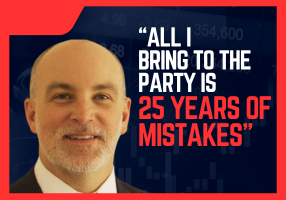DISCLOSURES
This commentary is being provided to you as general information only and should not be taken as investment advice. The opinions expressed in these materials represent the personal views of the author(s). It is not investment research or a research recommendation, as it does not constitute substantive research or analysis. Any action that you take as a result of information contained in this document is ultimately your responsibility. Epsilon Theory will not accept liability for any loss or damage, including without limitation to any loss of profit, which may arise directly or indirectly from use of or reliance on such information. Consult your investment advisor before making any investment decisions. It must be noted, that no one can accurately predict the future of the market with certainty or guarantee future investment performance. Past performance is not a guarantee of future results.
Statements in this communication are forward-looking statements.
The forward-looking statements and other views expressed herein are as of the date of this publication. Actual future results or occurrences may differ significantly from those anticipated in any forward-looking statements, and there is no guarantee that any predictions will come to pass. The views expressed herein are subject to change at any time, due to numerous market and other factors. Epsilon Theory disclaims any obligation to update publicly or revise any forward-looking statements or views expressed herein.
This information is neither an offer to sell nor a solicitation of any offer to buy any securities.
This commentary has been prepared without regard to the individual financial circumstances and objectives of persons who receive it. Epsilon Theory recommends that investors independently evaluate particular investments and strategies, and encourages investors to seek the advice of a financial advisor. The appropriateness of a particular investment or strategy will depend on an investor’s individual circumstances and objectives.










This comment may have better been left after the podcast, but I will leave it here. In your analysis of who is available to catch the new strain you eliminated those who have been vaccinated and those who have already had Covid. The CDC has that number at an artificially high number and I agree with you on that.
However , if someone had Covid over 90 days ago are they not vulnerable to catch it again? Would that not make the number of people susceptible to the new outbreak even higher? Most of the people that the CDC says had it and never got tested would have 6 months or longer their antibodies may well be gone. As someone who has recovered I hope my analysis on this is wrong.
From what I’ve read, there is evidence against the premise the UK strain defeats natural immunity effectively (and evidence that vaccine immunity is all but the same efficacy). Evidence generally supported immunity lasting at least 6 months, and it is likely the immune system’s memory lasts at least 9-12 months.
The same cannot be said for the Brazil (and possibly SA) variants, where they seem to be seeing re-infections. Manaus, Brazil was estimated to have 50-75% of the population infected by October 2020 and they’re now seeing a 2nd surge. I think the new viral strain is certainly a probable cause (especially as it has mutations on the same regions that a virus exposed to repeated doses of convalescent plasma did).
This is something that’s been running circles in my head for the last couple weeks. And I want to be clear that I’m speaking on from the perspective of the impact on markets here, not the impact on human life.
When we first started hearing about the B117 variant, I had my “wall of worry” reaction. You know, the one where a nebulous idea takes hold of market participants who don’t really understand it, only for it to release the markets once a solution is found or it turns out to not be any problem at all.
But by early January, I saw the case curves in the UK and Ireland. They were awful. And I started to get a flashback to January of 2020. Because this is exactly how things started then. I watched for a couple more days, and then on January 8, I sold 80% of my equity exposure.
I bought it back one hour later.
Not because I don’t think B117 has the potential to drive further exponential spread in the US. Not because I don’t think B117 could dramatically increase the number of deaths we see over the next 2-3 months. Not because I think we have any handle on this that could possibly reduce spread over that time period. I bought my equity exposure back because I view the market reaction to this as having two stories that I do think are fundamentally hard to challenge:
- The vaccine timeline is way, way closer right now, meaning that even if we see a huge ramp up in infections and death, we are far closer to being through it than we were last March. 1-2 quarters of bad economic news is different from the potential end of the world.
- My investment time horizon for the bulk of my investments is looking at 2-3 year trends. And regardless of the short-term hurdle we may run into, it’s hard to see B117 changing my overall outlook for that time horizon. And I don’t want to get sucked into playing someone else’s game that I’m not familiar with.
It’s not that I think equity markets can’t go down. It’s that for me and how I’ve built my portfolio structure, I’m ok with whatever unrealized losses I see in the short-term, because I still have conviction that over the time period that I’m looking at, we’re able to see a significant resumption in economic activity with a bunch of fiscal support backing it.Now, the SA variant that apparently may have some problems with neutralization from the vaccine? That has my spidey-sense more worried when it comes to my investment timeframe and thesis. I’ve been thinking about it a lot this morning. I’m still not quite sure what to do, and generally if I’m not sure what to do, the best thing is usually nothing. But I’ll be watching it closely over the next week or two, because the lack of vaccine effectiveness against a new variant is something that is more threatening to my portfolio. So while I think B117 could be a disaster when it comes to human life, when it comes to my portfolio, it draws me closer to playing a game that I don’t think I can succeed at, and so I choose to ignore it because it’s an acceptable risk over a timeframe that I can afford losses.
Thanks for the information Kessler ??
This is exactly what I’ve read as well … evidence for long-lasting immune memory from prior Covid infections against new baseline Covid infections (incl B117), but problematic indications for Brazil variant (and maybe S. Africa, too).
I think everything you write here makes a ton of sense. And there’s no doubt in my mind that the only thing that could really derail this market is, as you say, a lack of vaccine effectiveness against a prominent viral strain.
Two questions Ben.
First, (from the Podcast) with regard to the contention that the number of cases may be overstated by the CDC b/c they use typical flu modelling of who reports their illness… The CDC has several studies on their website (not conducted by them) that estimate the true number of cases based upon serological testing. When I looked at them awhile back, they suggested that the true actual case rate was likely 5-25x the confirmed rate. The CDS was not accepting/endorsing any of these studies, but is it possible that their total case estimate of 100m is backed up by more than just their traditional pro-forma flu modelling.
Second, why is it that … “the longer it takes for B117 clusters to appear, the less the impact of B117 common knowledge on markets”. That is not intuitive to me. What happens over time to appearance that mitigates the common knowledge process?
As always, regards.
SG
Ben, I am surprised that you don’t think Inflation is a very real risk to stock markets (and other). Even if the Fed ignores rising inflation above 2%, wouldn’t the market have to start discounting the beginning of the end of the Fed Put ??
The key is the extreme valuations the stock market is facing now.
Doesn’t take much with these extremes, in fact Jeremy Grantham says it never is “an event” that pops the bubble (he ascribes this market as a classic bubble) .
All’s it takes is for Financial conditions to be a bit less bubbly than before.
Seems to me that evidence that inflation is starting to get out of hand qualifies as a “less bubbly financial conditions” thing.
Good questions, Sal, and I’ll cover them in depth with my next note.
(https://www.cdc.gov/coronavirus/2019-ncov/cases-updates/commercial-lab-surveys.html)
//:0
I’ve been writing about the very real risk that inflation poses to this market for a long time. It is the Fourth Horseman, and it is the only thing that I believe can break the Central Bank Omnipotence narrative that has created the market bubble. (https://www.epsilontheory.com/things-fall-apart-part-3-markets/)
That said, a Covid resurgence is a profoundly deflationary event. It just is.